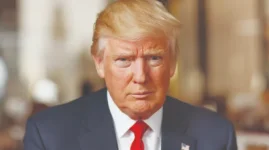The South African Reserve Bank plans to keep interest rates at 7.5 percent despite prices going up less than expected last month. The bank needs time to assess how Donald Trump's trade policies might affect inflation rates down the road.
Bloomberg asked many economists what they think will happen. Most predict Governor Lesetja Kganyago will keep the benchmark rate unchanged when he announces Johannesburg yesterday. These experts believe four committee members will support keeping rates steady, and two will push for a decrease.
The South African economy faces tough times, and inflation held steady at 3.2 percent in February. This number came in below what analysts expected at 3.4 percent. Patrick Buthelezi from Sanlam Investment says the bank will likely pause rate cuts until the situation becomes more predictable.
The main worry centers on the US Federal Reserve possibly raising interest rates because Trump's tariffs might drive up prices. Since becoming president again in January, Trump has added tariffs on many countries. He plans to charge additional fees to trading partners starting April 2.
These trade actions have pushed long-term inflation expectations higher than at any time since 1993. If American interest rates go up to fight inflation, South Africa may need to follow. Buthelezi cautions that failing to match US rates would weaken the South African currency.
Tertia Jacobs at Investec Bank believes the central bank will say risks remain high because of trade disputes and market uncertainty. This stance continues even though the rand has performed better lately and oil prices have decreased.
South Africa's worsening relationship with the United States gives the bank another reason to wait. Many fear South Africa could lose its special status under the African Growth and Opportunity Act, which covers $3.6 billion in exports to America.
These concerns have led big investment firms like Franklin Resources, JPMorgan Chase, and Wells Fargo to sell South African bonds rapidly. This selling has created the fastest outflows since before the May elections. Budget problems add extra uncertainty.
Andrew Matheny from Goldman Sachs says economic conditions support cutting interest rates, but budget questions will prevent changes for the moment. The proposed budget includes raising the value-added tax by half a percentage point during the next two fiscal years.
The Democratic Alliance and other parties don't support this tax increase, making it unclear if parliament will pass it. The DA is the second-largest party in the coalition formed after the African National Congress lost its majority last year. These political groups continue to meet to resolve their disagreements.
Bloomberg asked many economists what they think will happen. Most predict Governor Lesetja Kganyago will keep the benchmark rate unchanged when he announces Johannesburg yesterday. These experts believe four committee members will support keeping rates steady, and two will push for a decrease.
The South African economy faces tough times, and inflation held steady at 3.2 percent in February. This number came in below what analysts expected at 3.4 percent. Patrick Buthelezi from Sanlam Investment says the bank will likely pause rate cuts until the situation becomes more predictable.
The main worry centers on the US Federal Reserve possibly raising interest rates because Trump's tariffs might drive up prices. Since becoming president again in January, Trump has added tariffs on many countries. He plans to charge additional fees to trading partners starting April 2.
These trade actions have pushed long-term inflation expectations higher than at any time since 1993. If American interest rates go up to fight inflation, South Africa may need to follow. Buthelezi cautions that failing to match US rates would weaken the South African currency.
Tertia Jacobs at Investec Bank believes the central bank will say risks remain high because of trade disputes and market uncertainty. This stance continues even though the rand has performed better lately and oil prices have decreased.
South Africa's worsening relationship with the United States gives the bank another reason to wait. Many fear South Africa could lose its special status under the African Growth and Opportunity Act, which covers $3.6 billion in exports to America.
These concerns have led big investment firms like Franklin Resources, JPMorgan Chase, and Wells Fargo to sell South African bonds rapidly. This selling has created the fastest outflows since before the May elections. Budget problems add extra uncertainty.
Andrew Matheny from Goldman Sachs says economic conditions support cutting interest rates, but budget questions will prevent changes for the moment. The proposed budget includes raising the value-added tax by half a percentage point during the next two fiscal years.
The Democratic Alliance and other parties don't support this tax increase, making it unclear if parliament will pass it. The DA is the second-largest party in the coalition formed after the African National Congress lost its majority last year. These political groups continue to meet to resolve their disagreements.












